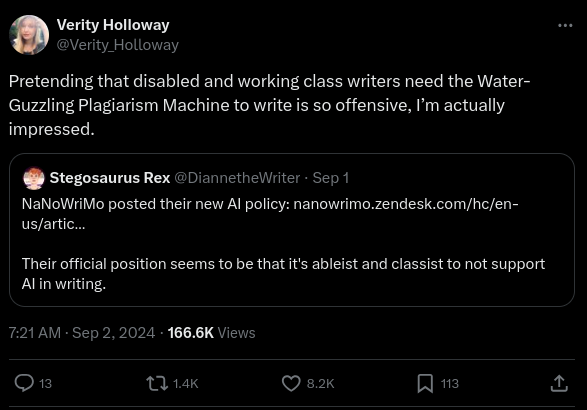NaNoWriMo’s controversial AI policy stance
This month, the organisers of National Novel Writing Month (NaNoWriMo) released a policy on the use of artificial intelligence, stating how “the categorical condemnation of Artificial Intelligence has classicist and ableist undertones, and that questions around the use of AI tie to questions about privilege.”
This led to an outcry on social media, with members of the organisation’s Writers Board resigning within hours.
The organisation, which gained worldwide renown from its creation in 1999, challenges aspiring authors to write a little over 1600 words a day, to reach a goal of 50,000 words in a month, reaching a suitable length of a novel. While not all genres accept 50k works as appropriate length for a finished work, the object of ‘winning’ NaNoWriMo is to have achieved that word count, and come away with a first draft.
This is not the first time the organisation has come under fire however, as just last year, there were allegations of a forums moderator attempting grooming, which led to an overhaul of the company’s practices when dealing with minors and closing down of the forums.
Since this month’s AI policy led to an outcry on social media, the organisers behind NaNoWriMo revised their statement, to add:
“Though we find the categorical condemnation for AI to be problematic for the reasons stated below, we are troubled by situational abuse of AI, and that certain situational abuses clearly conflict with our values. We also want to make clear that AI is a large umbrella technology and that the size and complexity of that category (which includes both non-generative and generative AI, among other uses) contributes to our belief that it is simply too big to categorically endorse or not endorse.
We believe that to categorically condemn AI would be to ignore classist and ableist issues surrounding the use of the technology, and that questions around the use of AI tie to questions around privilege.
Classism. Not all writers have the financial ability to hire humans to help at certain phases of their writing. For some writers, the decision to use AI is a practical, not an ideological, one. The financial ability to engage a human for feedback and review assumes a level of privilege that not all community members possess.
Ableism. Not all brains have same abilities and not all writers function at the same level of education or proficiency in the language in which they are writing. Some brains and ability levels require outside help or accommodations to achieve certain goals. The notion that all writers “should“ be able to perform certain functions independently or is a position that we disagree with wholeheartedly. There is a wealth of reasons why individuals can't "see" the issues in their writing without help.
General Access Issues. All of these considerations exist within a larger system in which writers don't always have equal access to resources along the chain. For example, underrepresented minorities are less likely to be offered traditional publishing contracts, which places some, by default, into the indie author space, which inequitably creates upfront cost burdens that authors who do not suffer from systemic discrimination may have to incur.
These points about classicism and ableism have offended writers. It has also been noted that the company has a corporate sponsor that offers an AI function.
This policy has been interpreted by some as no more than showing support for pro-AI sponsors and the use of generative AI in writing, which can defeat the purpose of producing original prose.
I spoke with Berenice Baker, editor at AI Business about it. I commented:
““The problem with organizations like NaNoWriMo encouraging writers to use AI tools is that it can not only stifle creativity but also encourage digital plagiarism, where the person is no longer writing. The AI bot is doing the writing for them and the human is taking credit for it,” said historical mystery author E.L. Johnson.
“But with the use of AI tools comes great temptation and it’s down to the writer to enforce that restriction on themselves, particularly as literary agencies and publishers stress they do not want AI-written content,” ”
I also put her in touch with Theresa Greene, organiser and co-founder of the Writer’s Workout, for comment. You can read the full article here.

